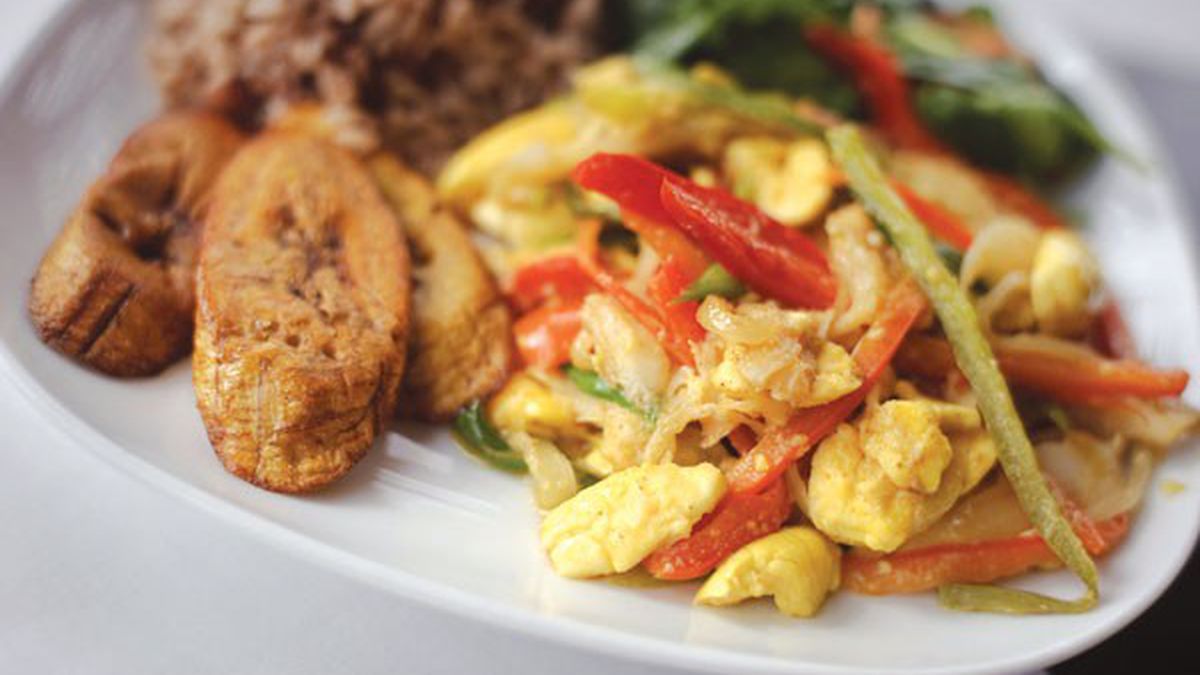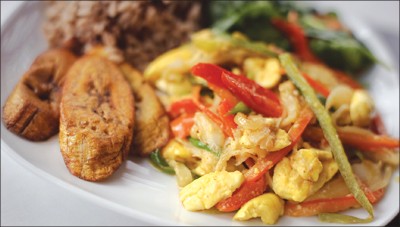When a fritter is hot, you know you’re in the right place. When the fritter is so hot that it would sear your mouth if you didn’t blow on it first, when the fritter gleams golden with dark, toasty wisps where the batter struck boiling oil and fried midflight, when it huffs steam into your face, this proves that whoever cooked it cares enough — about it and about you — to make it right and make it yours right now.
Fried treats at Flavah Island, which opened last September in the virtual shadow of Berkeley’s Lanesplitter and brought more Jamaican cuisine to a wildly diverse neighborhood, include the spicy, dense cornmeal dumplings called “festival” as well as plantains and exquisite fritters whose scallion-flecked salted cod — the “salt fish” that is praised in the old song “Jamaica Farewell” — has a texture closer to that of pudding than that of fish.
And of course that’s a good thing.
So is the sunny yellow ackee, Jamaica’s national fruit, brought across the Atlantic from Africa on slave ships and related to the longan but looking, feeling, and tasting for all the world like scrambled eggs. Served here on crisp toast triangles, the fruit can be toxic if it is forced open rather than allowed to split naturally when ripe; thus it cannot be imported fresh into the US, but is grown in Florida and Hawaii and sold legally in cans.
A tall glass of explosively gingery, ruby-red sorrel punch counterbalanced the rice and red beans whose plainness was juxtaposed itself by plump, poker-chip-size shrimp in a garlicky tomato concassé, which is served, as are all entrées here, with spinach-and-carrot “island slaw” and — counterbalance, again — plantain slabs. Dark and oily-rich, the banana’s bland cousin comforts with that primal unprocessed starchiness you find in plants that become staples in places where grains don’t grow well, such as potatoes, breadfruit, and yams.
Garlic is king at Flavah Island, pea-size hunks of it basking in zesty sauces and stews. The house-made crimson dip that comes with the fried treats is tearjerkingly spicy. Owner-chef Don Ediwards, a Kingston native, makes this and everything else from scratch with quiet artistry, drawing upon a colonial-culture cuisine born of tragedy and slavery and spirit and endurance, a rib-sticking yet innately creative cuisine that draws in turn upon memories of Africa, India, China, the British Isles, and the West Indies’ own flamboyantly fruitful soil and sea.
Witness flaky-crusted “cocktail patties,” a classic Jamaican snack: beef turnovers, with a faint whiff of curry. Witness clovey-fruity-vinegary Pickapeppa Sauce: wild, yet dignified. Witness dish after Jamaican dish that is shamelessly engorged with glorious hot oil, flaunting spices both obediently English and tropically brash.
Ediwards, who used to cook at Jamaican resorts, makes traditional dishes — curried goat, sautéed salted cod, escovitched fish, steak-and-potatoes, a kind of dumpling known as a “spinner,” and his popular braised oxtail — based on his aunt’s and grandmother’s recipes. Experiments such as Rasta Pasta — a meatless standout featuring whole-wheat fettuccini in a thick, basil-scented soy-cream sauce, worthy of any fancy restaurant in town — are his own inventions.
Some dishes are classic-nouveau fusions: Representing Jamaica’s deeply rooted Chinese community, of which the dancehall performer Sean Paul’s grandfather was a member, JamAsian Stir Fry is a mountain of chewy and irresistibly smoky flat noodles, sautéed with vegetables and a choice of either chicken or cashews and tofu, dazzlingly fresh and expertly seared and cloud-fluffy inside. Another vegetarian entrée, Ital Stew, features black-eyed peas and seasonal vegetables — ours had pumpkin and peppers — simmered in coconut-cream sauce with thyme.
This and everything else here, including full $2.99 breakfasts featuring enormous berry-topped pancakes, comes in such generous portions at such bargain-basement prices that you almost wish you could pay more, just to be fair.
Time stretches here. It spreads, then sprints. In a world characterized by fast food, we forget to think of real restaurant meals being served this way: rushed out from the kitchen with hope-you-like-it smiles, set down stoutly upon scallop-edged white placemats, the food sighing and sizzling as if to say: There really is such a thing as piping hot.
Granted, up until that moment, you’ve had a bit of a wait. Don’t arrive here in a rush, because your order will take time. These are labor-intensive recipes, made to order, and Ediwards and a partner run this place virtually on their own. At one point, I saw the partner run to a market across the street to buy an ingredient — I’m not sure which one — but for some reason I took that as a compliment. Humble yet worth the wait, “festival” evoked sturdy, savory doughnut holes. Tinted yellow with turmeric, “cocktail patties” shone like crimped half-suns. Both exhaled heat. Because it matters, the food at Flavah Island is made fastidiously, then delivered in a flash. It’s slow fast food.
But reveling in codfish, I watched passersby stream past as if this place was invisible. What would it take, I wondered, to make them see?













